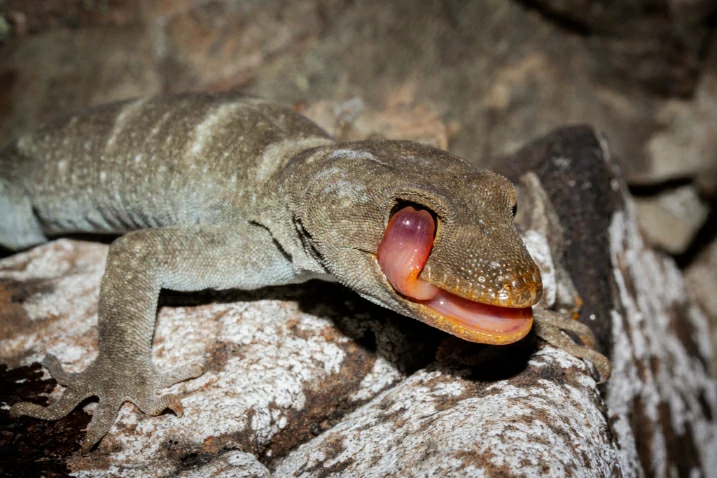It’s a quiet night, and you notice your gecko in her tank, moving carefully across the warm rocks. She pauses near a hiding spot and lays two small, soft-looking eggs.
You watch her, curious. She seems gentle and deliberate, like she knows exactly what she’s doing. But once she’s done, she just walks away, not even glancing back.
You wonder for a moment, does she really not care for her babies? Do geckos care for their young at all?
No, most geckos don’t care for their young. After laying eggs, female geckos usually leave them completely alone. They don’t protect, feed, or even check on the hatchlings once they emerge. The tiny geckos are born fully independent, able to survive on their own from day one.
That might sound harsh, but for geckos, it actually works. Their babies are perfectly built to fend for themselves; tiny versions of the adults, ready to hide, hunt, and survive without any help.
Geckos Are Independent From the Start
Gecko babies don’t go through a helpless phase like mammals or birds. They don’t need their mother’s warmth or milk.
Instead, they hatch as self-sufficient miniatures of adults. Within hours, they can walk, climb, and catch small prey like fruit flies or pinhead crickets.
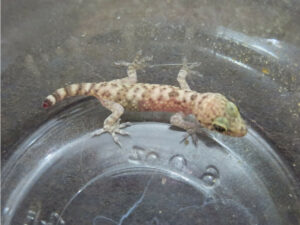
This independence is part of what makes geckos so successful in the wild. A female doesn’t have to spend time or energy guarding her eggs or caring for her babies.
She can focus on surviving, eating, and laying more eggs later.
In fact, many geckos, like leopard geckos, crested geckos, and house geckos, have evolved to survive this way.
Their babies are instinctively cautious, quick, and ready to blend into their surroundings. They don’t rely on anyone.
Why Geckos Don’t Need Parental Care
It’s easy to think a mother gecko should look after her eggs like a bird does, but reptiles don’t work like that.
Their bodies and instincts are built for a different strategy, something scientists call an “r-selected” reproductive strategy.
This means geckos focus on producing many babies with little investment in each one. Instead of raising a few carefully, they lay multiple clutches over time. Even if some eggs don’t survive, a few will.
In the wild, this makes sense. A gecko might lay her eggs under bark, inside a tree hollow, or hidden beneath rocks. The eggs are camouflaged and left to develop on their own. When they hatch, the young are already adapted to life without help.
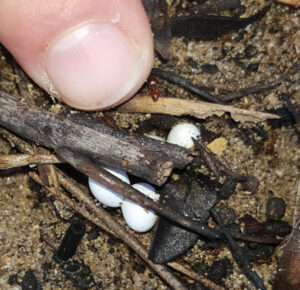
It’s basically nature saying, “Good luck, little one, you’ve got this.”
But Are There Any Exceptions?
Actually, yes, but they’re rare. Most geckos completely ignore their eggs, but a few species show tiny hints of what could be called maternal behavior.
Some day geckos in Madagascar sometimes pick safe communal nesting spots and reuse them repeatedly.
Multiple females lay eggs in the same secure location. They don’t guard the eggs, but keeping them in a proven safe spot improves survival.
Another interesting example is Oudri’s fan-footed gecko (Ptyodactylus oudrii), which lives in parts of North Africa.
These geckos practice communal nesting, where several females lay their eggs together in the same crevice or hidden spot.
Sometimes, adults stick around for a short time, which can help keep the eggs safe from predators or harsh conditions.
While this isn’t full parental care, it’s a rare look at geckos doing a little bit to help their babies.
Another example is the Tokay gecko, a large and famously loud species from Asia. Tokay mothers have been seen guarding their eggs for a short time after laying them, sometimes staying nearby until the babies hatch.
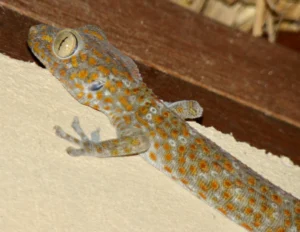
Even then, the care ends right there. Once the hatchlings emerge, the mother doesn’t feed or protect them anymore.
So while geckos aren’t nurturing like mammals, a few species do take small steps toward protecting their offspring, mostly by picking good nesting spots or sticking around briefly.
How Do Gecko Babies Survive Without Parents?
You might wonder how something so tiny can survive on its own. It’s all thanks to instincts and clever adaptations.
When a baby gecko hatches, it already knows how to hide and find food. It’s not learning from parents.
That’s why baby geckos immediately scurry for cover once they break out of the egg.
Here’s what helps them survive:
-
Camouflage: Their colors and patterns help them blend into their surroundings.
-
Nocturnal habits: Many hatchlings are active at night when predators are less likely to see them.
-
Quick reflexes: Even newborn geckos can dash for cover or drop their tails to escape danger.
-
Independent feeding: Within a few days, they start hunting for tiny insects like fruit flies or small crickets.
Basically, gecko hatchlings don’t need parenting. They’re born ready to handle the world.
What About Gecko Eggs? Do Mothers Guard Them?
In most cases, no. Female geckos lay eggs in safe, hidden spots and walk away. They instinctively pick places that offer protection from predators, heat, and moisture loss.
For example, a crested gecko might bury her eggs in damp soil or moss, while a leopard gecko prefers a humid hide or burrow. Once the eggs are laid, the mother’s job is done.
Many gecko eggs are leathery rather than hard like bird eggs. They need steady humidity to develop, but they’re tough enough to survive without constant care.
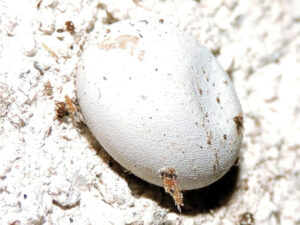
Some species, like house geckos, even glue their eggs to walls or ceilings in secure corners where other animals can’t reach them.
So while it might look like the mother doesn’t care, her instinct to pick a good nesting site gives her young the best possible start.
In Captivity, Things Work a Little Differently
If you keep geckos as pets, you’ve probably noticed they act differently from wild geckos.
In captivity, they live in a safe space without predators, harsh weather, or competition. But even in this safe setting, they don’t care for their eggs or babies.
If you breed leopard geckos, the mother will usually lay her eggs in a humid hide and then move on.
If the eggs stay in the tank, the adults might even accidentally step on or eat them. That’s why breeders carefully remove the eggs and incubate them separately.
Once the babies hatch, they live independently in their own enclosures until they’re big enough. They never rely on their parents for protection or food. It’s just not in their nature.
Why This Strategy Works So Well in the Wild
It might seem cold to us, but this “no-parenting” approach works beautifully for geckos. If a gecko spent weeks protecting her eggs, she’d expose herself to predators and waste valuable energy.
By laying eggs and leaving them hidden, she can survive to reproduce again later. It’s an efficient way to make sure her genes carry on.
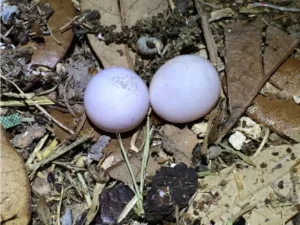
This strategy also allows geckos to live in a wide range of environments; from rainforests to deserts to city walls. Their success comes from producing enough young that at least some survive, even without care.
It’s not nurturing in a human sense, but it’s extremely effective for survival.
Do Baby Geckos Ever See Their Parents Again?
No. Once hatched, baby geckos never reunite with their parents. They grow up completely alone, learning everything through instinct.
If an adult gecko comes across a hatchling, it wouldn’t recognize it as its own. In some cases, adults might even see babies as potential food, especially in captivity.
That’s why breeders always separate adults and hatchlings.
It might seem sad to us, but for geckos, that’s normal. Every baby starts its journey alone.
Comparing Geckos to Other Reptiles
Geckos aren’t unique in skipping parental care. Most reptiles do the same.
- Snakes usually lay eggs and leave them, though a few, like pythons, stay with their eggs for warmth.
- Turtles bury their eggs in sand and never come back.
- Lizards, including geckos, generally rely on hidden nests and instinct-driven young.
Reptiles generally trade parenting for numbers. Instead of raising a few carefully, they make many and let nature decide which survive.
Some skinks and crocodiles protect their eggs or stay near hatchlings, but geckos don’t.
What Happens After the Eggs Hatch?
When eggs finally hatch, usually after several weeks depending on temperature, baby geckos break through the shell using a small egg tooth.
They emerge tiny but fully formed, with sticky toes, bright eyes, and curiosity. Right away, they find a safe hiding spot, rest briefly, and start exploring.
Within a day or two, they begin hunting. They never rely on parents for food or warmth.
They grow fast, shedding often, and start to look like small adults in just a few months. Every step happens without parental involvement.
How Long Until Gecko Babies Become Adults?
Growth rates depend on species, temperature, and diet. Most geckos reach adulthood in about 6 to 12 months.
Smaller species may grow faster, while larger ones, like Tokay geckos, take longer.
Throughout this time, they live independently, finding hiding places, avoiding predators, and learning survival through instinct.
Once adults, they repeat the cycle: mate, lay eggs, and move on. It may seem lonely, but it’s exactly what nature designed them for.
Conclusion
So, do geckos care for their young? Not really. Once a female lays her eggs, she’s done. The eggs develop on their own, and the babies hatch ready to face the world.
A few rare species show slight protective behaviors, but true parental care isn’t part of gecko life.
Instead, they rely on instinct, camouflage, and clever hiding to survive.
It might seem cold to us, but in geckos’ world, independence is the key to survival. Each tiny hatchling starts its journey alone, perfectly built to thrive all on its own.
Hi, my name is Ezra Mushala, i have been interested animals all my life. I am the main author and editor here at snakeinformer.com.

